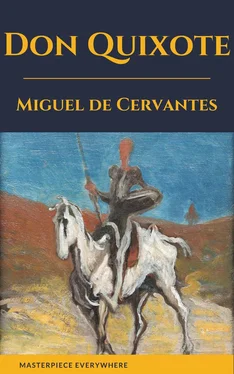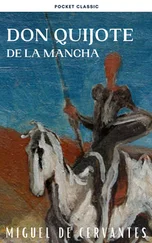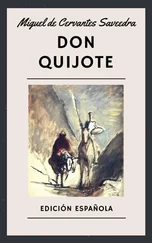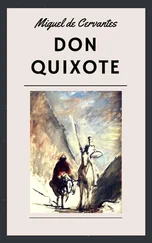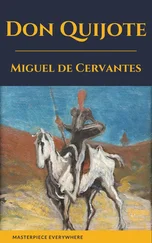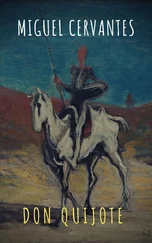"That is what vexes me, and what ought to vex thee, Sancho," replied Don Quixote; "but henceforward I will endeavour to have at hand some sword made by such craft that no kind of enchantments can take effect upon him who carries it, and it is even possible that fortune may procure for me that which belonged to Amadis when he was called 'The Knight of the Burning Sword,' which was one of the best swords that ever knight in the world possessed, for, besides having the said virtue, it cut like a razor, and there was no armour, however strong and enchanted it might be, that could resist it."
"Such is my luck," said Sancho, "that even if that happened and your worship found some such sword, it would, like the balsam, turn out serviceable and good for dubbed knights only, and as for the squires, they might sup sorrow."
"Fear not that, Sancho," said Don Quixote: "Heaven will deal better by thee."
Thus talking, Don Quixote and his squire were going along, when, on the road they were following, Don Quixote perceived approaching them a large and thick cloud of dust, on seeing which he turned to Sancho and said:
"This is the day, Sancho, on which will be seen the boon my fortune is reserving for me; this, I say, is the day on which as much as on any other shall be displayed the might of my arm, and on which I shall do deeds that shall remain written in the book of fame for all ages to come. Seest thou that cloud of dust which rises yonder? Well, then, all that is churned up by a vast army composed of various and countless nations that comes marching there."
"According to that there must be two," said Sancho, "for on this opposite side also there rises just such another cloud of dust."
Don Quixote turned to look and found that it was true, and rejoicing exceedingly, he concluded that they were two armies about to engage and encounter in the midst of that broad plain; for at all times and seasons his fancy was full of the battles, enchantments, adventures, crazy feats, loves, and defiances that are recorded in the books of chivalry, and everything he said, thought, or did had reference to such things. Now the cloud of dust he had seen was raised by two great droves of sheep coming along the same road in opposite directions, which, because of the dust, did not become visible until they drew near, but Don Quixote asserted so positively that they were armies that Sancho was led to believe it and say, "Well, and what are we to do, senor?"
"What?" said Don Quixote: "give aid and assistance to the weak and those who need it; and thou must know, Sancho, that this which comes opposite to us is conducted and led by the mighty emperor Alifanfaron, lord of the great isle of Trapobana; this other that marches behind me is that of his enemy the king of the Garamantas, Pentapolin of the Bare Arm, for he always goes into battle with his right arm bare."
"But why are these two lords such enemies?"
"They are at enmity," replied Don Quixote, "because this Alifanfaron is a furious pagan and is in love with the daughter of Pentapolin, who is a very beautiful and moreover gracious lady, and a Christian, and her father is unwilling to bestow her upon the pagan king unless he first abandons the religion of his false prophet Mahomet, and adopts his own."
"By my beard," said Sancho, "but Pentapolin does quite right, and I will help him as much as I can."
"In that thou wilt do what is thy duty, Sancho," said Don Quixote; "for to engage in battles of this sort it is not requisite to be a dubbed knight."
"That I can well understand," answered Sancho; "but where shall we put this ass where we may be sure to find him after the fray is over? for I believe it has not been the custom so far to go into battle on a beast of this kind."
"That is true," said Don Quixote, "and what you had best do with him is to leave him to take his chance whether he be lost or not, for the horses we shall have when we come out victors will be so many that even Rocinante will run a risk of being changed for another. But attend to me and observe, for I wish to give thee some account of the chief knights who accompany these two armies; and that thou mayest the better see and mark, let us withdraw to that hillock which rises yonder, whence both armies may be seen."
They did so, and placed themselves on a rising ground from which the two droves that Don Quixote made armies of might have been plainly seen if the clouds of dust they raised had not obscured them and blinded the sight; nevertheless, seeing in his imagination what he did not see and what did not exist, he began thus in a loud voice:
"That knight whom thou seest yonder in yellow armour, who bears upon his shield a lion crowned crouching at the feet of a damsel, is the valiant Laurcalco, lord of the Silver Bridge; that one in armour with flowers of gold, who bears on his shield three crowns argent on an azure field, is the dreaded Micocolembo, grand duke of Quirocia; that other of gigantic frame, on his right hand, is the ever dauntless Brandabarbaran de Boliche, lord of the three Arabias, who for armour wears that serpent skin, and has for shield a gate which, according to tradition, is one of those of the temple that Samson brought to the ground when by his death he revenged himself upon his enemies. But turn thine eyes to the other side, and thou shalt see in front and in the van of this other army the ever victorious and never vanquished Timonel of Carcajona, prince of New Biscay, who comes in armour with arms quartered azure, vert, white, and yellow, and bears on his shield a cat or on a field tawny with a motto which says Miau, which is the beginning of the name of his lady, who according to report is the peerless Miaulina, daughter of the duke Alfeniquen of the Algarve; the other, who burdens and presses the loins of that powerful charger and bears arms white as snow and a shield blank and without any device, is a novice knight, a Frenchman by birth, Pierres Papin by name, lord of the baronies of Utrique; that other, who with iron-shod heels strikes the flanks of that nimble parti-coloured zebra, and for arms bears azure vair, is the mighty duke of Nerbia, Espartafilardo del Bosque, who bears for device on his shield an asparagus plant with a motto in Castilian that says, Rastrea mi suerte." And so he went on naming a number of knights of one squadron or the other out of his imagination, and to all he assigned off-hand their arms, colours, devices, and mottoes, carried away by the illusions of his unheard-of craze; and without a pause, he continued, "People of divers nations compose this squadron in front; here are those that drink of the sweet waters of the famous Xanthus, those that scour the woody Massilian plains, those that sift the pure fine gold of Arabia Felix, those that enjoy the famed cool banks of the crystal Thermodon, those that in many and various ways divert the streams of the golden Pactolus, the Numidians, faithless in their promises, the Persians renowned in archery, the Parthians and the Medes that fight as they fly, the Arabs that ever shift their dwellings, the Scythians as cruel as they are fair, the Ethiopians with pierced lips, and an infinity of other nations whose features I recognise and descry, though I cannot recall their names. In this other squadron there come those that drink of the crystal streams of the olive-bearing Betis, those that make smooth their countenances with the water of the ever rich and golden Tagus, those that rejoice in the fertilising flow of the divine Genil, those that roam the Tartesian plains abounding in pasture, those that take their pleasure in the Elysian meadows of Jerez, the rich Manchegans crowned with ruddy ears of corn, the wearers of iron, old relics of the Gothic race, those that bathe in the Pisuerga renowned for its gentle current, those that feed their herds along the spreading pastures of the winding Guadiana famed for its hidden course, those that tremble with the cold of the pineclad Pyrenees or the dazzling snows of the lofty Apennine; in a word, as many as all Europe includes and contains."
Читать дальше
